(Chinhphu.vn) - On the morning of March 11th, Deputy Prime Minister Tran Hong Ha chaired a direct and online meeting of the Prime Minister's Task Force on reviewing, urging, and guiding the resolution of difficulties and obstacles in implementing real estate projects for localities and businesses (Task Force) after the Land Law (amended), the Real Estate Business Law (amended), the Credit Institutions Law (amended), and the Housing Law (amended) were enacted.
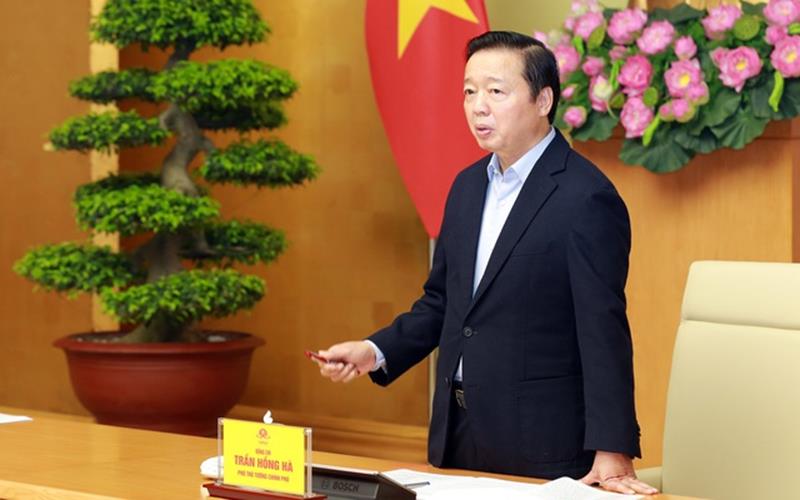
Deputy Prime Minister Tran Hong Ha: Resolving the proposals of businesses and localities must have specific addresses and deadlines. Which ministry or agency is responsible, and when will they complete it? - Photo: VGP/Minh Khoi
Deputy Prime Minister Tran Hong Ha emphasized that the difficulties and obstacles in the real estate market have a serious impact on many industries such as banking, construction, building materials production, consumer goods... Over the past time, the government and the Prime Minister have paid great attention, with many directives, meetings, forums to acknowledge opinions and find solutions to resolve the real estate market.
The government and the National Assembly have urgently amended related laws and are preparing to issue guiding documents for these laws. In addition, the "warming up" and positive signs of the economy also contribute to the efforts of businesses and real estate associations.
Deputy Prime Minister requested ministries, agencies, localities, associations, and businesses to carefully evaluate the effectiveness of the implementation of mechanisms, policies, and laws in resolving difficulties and obstacles in the real estate market, such as credit, planning, legal status, real estate business activities...
"The state will put all effort, with high determination and great efforts to fulfill responsibilities and authorities. At the same time, real estate investors and businesses must acknowledge their responsibilities in addressing the "paradox" of excessive high-end segment and lack of products for middle and low-income individuals, addressing the issues of "price inflation" and "price pushing" to align supply and demand...," Deputy Prime Minister stated clearly and emphasized that "we need to have clear, fair, objective viewpoints without evasion, in order to bring the real estate market back to normal operation."
Many institutional difficulties and obstacles have been resolved in the new laws
Deputy Minister of Construction Nguyen Van Sinh stated that in recent times, the real estate market in general and the resolution of difficulties in implementing real estate projects have experienced positive changes.
For example, in Hanoi, there are currently 404 projects. Through reviewing and classifying difficulties and obstacles, 81 projects have been removed from the slow implementation list, 10 projects have had their land acquired and activities terminated, and 67 projects continue to urge investors to accelerate the implementation progress. Hanoi is continuing to implement the resolution of difficulties and obstacles for 246 projects following the guidance of the Ministry of Construction and other relevant ministries and agencies.
Similarly, Ho Chi Minh City has implemented resolutions for 33 out of 72 projects requested by the working group, and 44 out of 148 projects recommended by the City's Real Estate Association. They are currently working on resolving difficulties and obstacles for 143 projects…
Many institutional difficulties and obstacles have been resolved by the new laws (such as the Procurement Law, the Housing Law (amended), the Real Estate Business Law (amended), the Land Law (amended), and the Credit Institutions Law (amended)). However, these laws have not yet come into effect, leading to the current delay in solving difficulties and obstacles.
Some localities have not established working groups or resolved difficulties, and there are still many obstacles in organizing and implementing legal regulations. There is a lack of focus on establishing and approving land use plans, construction plans, housing development plans for a five-year period and annual basis, which serve as the basis for approving investment decisions for housing development projects. Measures to promote land use rights auctions, land-use-related project tenders, and administrative procedure reforms are still progressing slowly...
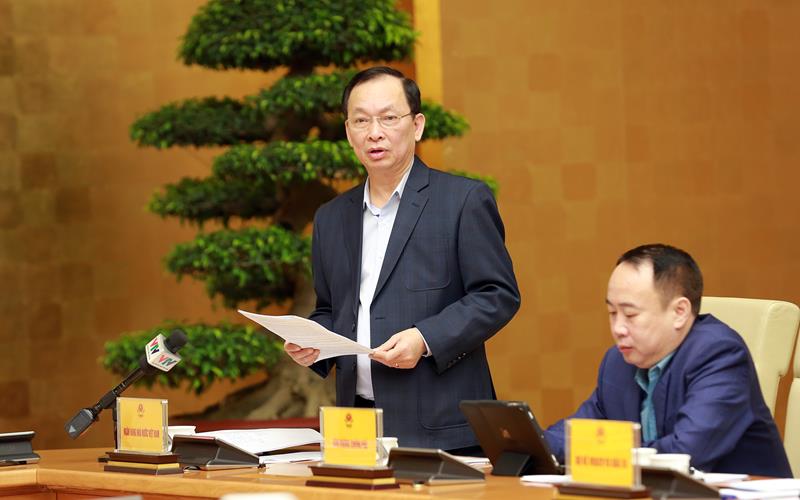
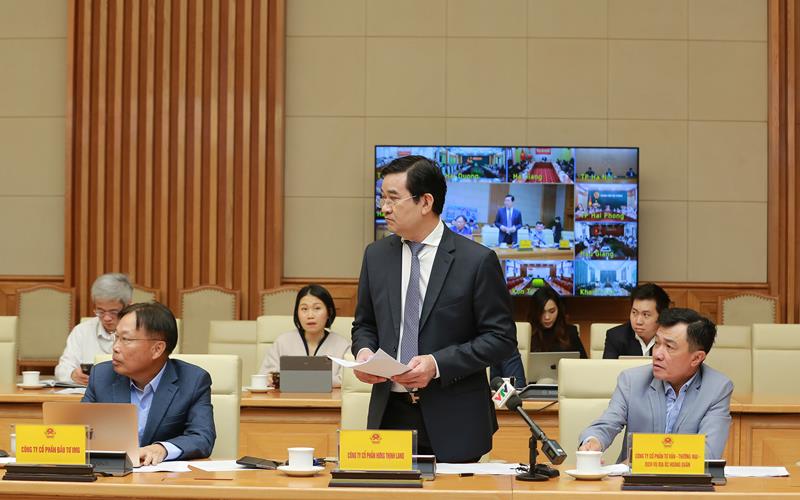
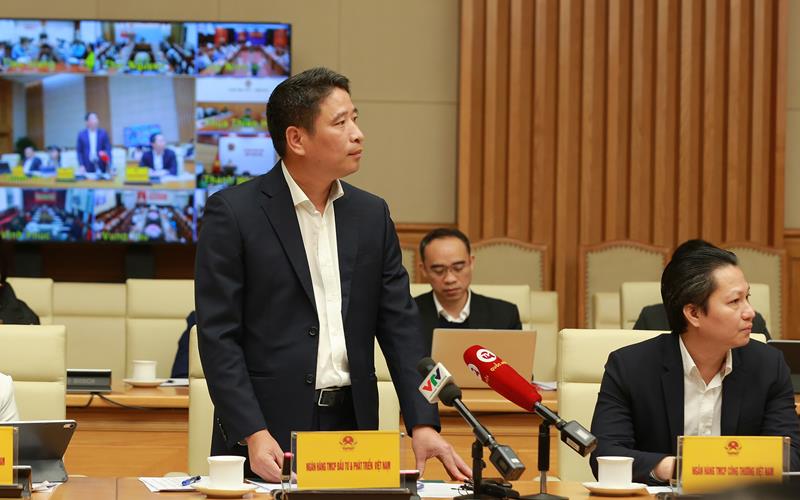
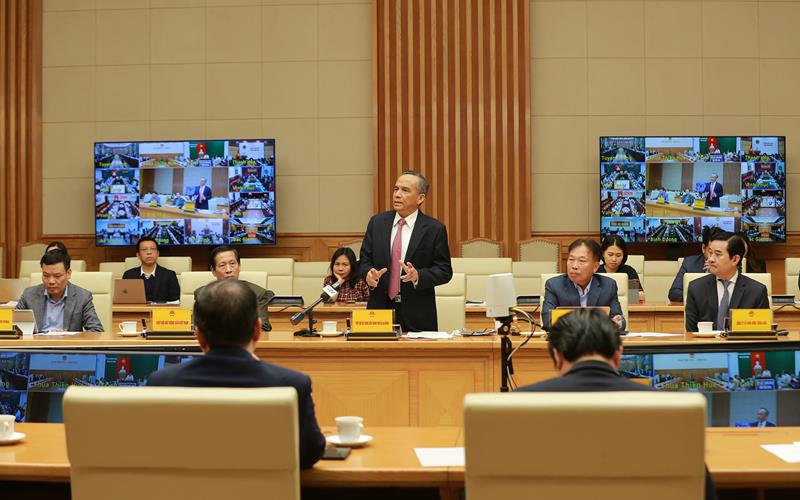
Leaders of ministries, agencies, and real estate enterprises discuss at the meeting - Photo: VGP/Minh Khoi
Controlling speculation and price manipulation in the real estate sector
At the meeting, leaders from the State Bank, associations, real estate enterprises, and banks focused on discussing solutions to determine reasonable prices for high-end commercial housing and evaluate the real estate market for customers with average and low incomes.
Deputy Governor of the State Bank, Dao Minh Tu, stated that the real estate sector "always goes hand in hand" with the banking industry and is related to various other sectors such as production, materials, and construction. "The banking sector closely controls credit in high-risk areas that, for the real estate sector, involve speculation and price manipulation, which hinders product consumption, disrupts capital flow, and makes debt recovery difficult," said Dao Minh Tu.
Regarding some obstacles in the 120 trillion VND social housing loan package, Mr. Dao Minh Tu believes that the key issue here is to create conditions for "demand meets supply" and boost the amount of supply. Based on that, objective market prices should be reduced in relation to supply and demand as well as with projects and corporations that inflate prices, create gaps, and engage in real estate speculation.
Representatives from banks such as BIDV, Agribank, Vietinbank, and the People's Committee of Hanoi mentioned difficulties in disbursing the 120 trillion VND commercial credit package for social housing. These difficulties include the ability of investors to meet financial capacity, collateral assets, project liquidity, and limitations on profit margins for social housing projects.
"Not all social housing construction companies that BIDV approaches have a need for loans because many projects do not yet meet the necessary conditions for implementation or are using their own capital," discussed Tran Phuong, Deputy General Director of BIDV.
Some companies have proposed shortening the time for reviewing legal procedures and the origin of land use for social housing projects, simplifying administrative procedures, relaxing credit access conditions for investors and buyers with average and low incomes.
Leaders from the Ministry of Finance, Ministry of Natural Resources and Environment, Ministry of Construction, and Government Inspectorate have exchanged views and clarified the proposals of companies and localities regarding land valuation, land use fees, land clearance, land allocation, the authority to adjust general planning, adjusting investment decisions in cases where projects only have land allocation decisions but lack investment decision-making according to housing and urban laws, bidding for projects involving public land, and allowing simultaneous approval of investment decisions and selection of commercial housing project investors in cases where "other land" instead of residential land is available. They also discussed projects that have been granted investment certificates but have not yet completed the process of approving investment decisions according to housing and urban laws, and approving investment decisions for the renovation of old apartment buildings.
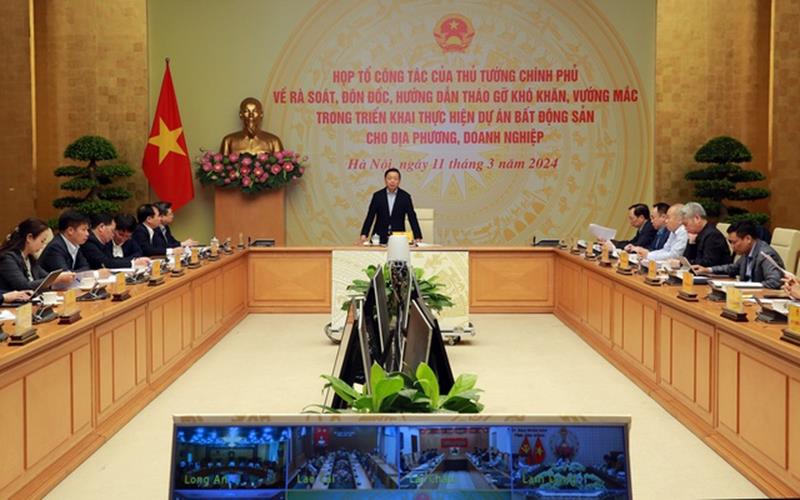
Deputy Prime Minister Tran Hong Ha hopes that real estate businesses and investors will offer products with appropriate selling prices, ensuring quality, design, aesthetics, and reasonable profitability that align with the interests of the state and the people. Photo: VGP/Minh Khoi
Regaining trust and developing a healthy real estate market
In conclusion, Deputy Prime Minister Tran Hong Ha emphasized that the development of a healthy real estate market contributes to economic and social growth, job creation, and ensuring people's access to housing.
In recent times, the real estate market has been affected by the domestic and global economic situation, especially after the COVID-19 pandemic, as well as weaknesses in the management of capital, land, and real estate markets. The challenge now is to regain the trust of investors in a systematic, coordinated, scientific, and responsive manner to the management of the real estate, land, credit, and capital sectors, in order to create a healthy market that encourages investment and business activities, while avoiding real estate bubbles.
The activities of the Task Force demonstrate the determination of the National Assembly, the Government, and local authorities to overcome difficulties and obstacles through institutional improvements, enhancing the effectiveness of implementation, and helping the real estate market overcome challenges, showing positive movements and gradually regaining the trust of businesses and investors.
Deputy Prime Minister Ha suggested that the Ministry of Construction summarize the main issues and obstacles that can be addressed in the amended and supplemented laws on land, housing, and real estate business, which have recently been passed. From there, proposals should be studied and submitted to the Government and the National Assembly for the issuance of relevant documents before the effective date of the laws.
The Task Force has compiled data on real estate projects that have been allocated land but are facing legal procedures, established criteria for real estate investors' capacity, summarized and codified the pilot implementation of local authorities' ability to adjust detailed planning for real estate projects without reducing general criteria. They have also expanded the scope of access to social housing for people with average and low incomes, as well as for businesses in industrial zones. Additionally, comprehensive guidance has been provided to localities to ensure the proper implementation of land acquisition, site clearance, resettlement, and land valuation policies.
"The resolution of proposals from businesses and localities must have specific addresses and deadlines. The responsible ministries and sectors should be clearly identified, along with the expected completion dates," Deputy Prime Minister Ha stated.
He assigned local authorities to calculate the specific needs of the people, allocate sufficient land funds for housing projects, and renovate old apartment buildings during the process of urban and rural planning. They should also report on the activities of the task forces in terms of overcoming difficulties and obstacles in the implementation of real estate projects.
Regarding funding for social housing projects, Deputy Prime Minister Ha requested that the State Bank and the Ministry of Finance study long-term financial policies to support interest rates for preferential credit loans, as well as establish a social housing investment fund consisting of state budget funds and contributions from businesses, covering 20% of the cost of social housing construction in commercial housing projects. Other legal sources should also be explored to support businesses in constructing social housing and to assist people in purchasing social housing, ensuring a balance between social policies and market mechanisms.
Deputy Prime Minister Ha expressed his hope that businesses and investors would calculate reasonable costs and offer commercial and social housing products with appropriate prices, ensuring quality, design, aesthetics, and reasonable profitability that align with the interests of the state and the people. This will contribute to the healthy development of the real estate market.